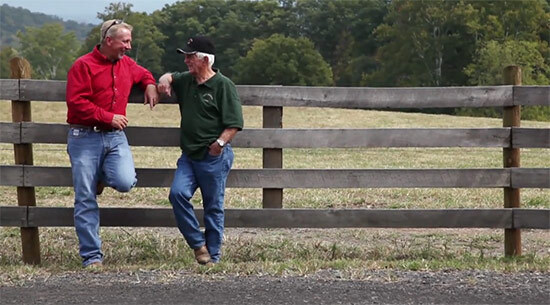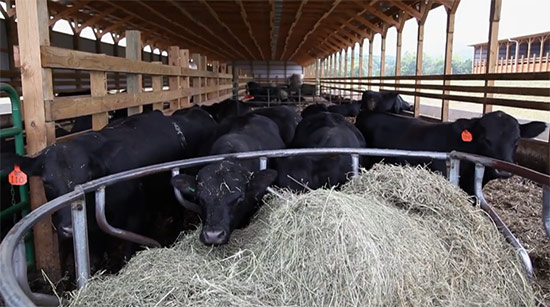Farm’s conservation practices cut pollution at its source
This father and son duo has implemented best management practices on their farm.
Cover crops, streamside trees and nutrient management plans: all are exceptional ways to reduce nutrient pollution in the Chesapeake Bay. And for father and son duo Elwood and Hunter Williams, restoring the Bay begins with conservation practices and a shift in mentality.
“We knew coming down the road that we needed to do a better job with keeping the water clean,” Hunter said. “We decided that if there was going to be a problem with the streams it wasn’t going to be us.”
Excess nutrients come from many places, including wastewater treatment plants, agricultural runoff and polluted air. When nitrogen and phosphorus reach waterways, they can fuel the growth of large algae blooms that negatively affect the health of the Bay. In order to reduce these impacts, the U.S. Environmental Protection Agency (EPA) has implemented a Bay “pollution diet,” known as the Total Maximum Daily Load (TMDL).
Since the passing of the TMDL, many farmers in the watershed have felt the added pressure of the cleanup on their shoulders, but for the Williams family, having the foresight to implement best management practices (BMPs) just seemed like the environmentally and fiscally responsible thing to do.
”We don’t want to get to a point where regulations are completely out of control,” Hunter explained. “Farmers know what they’re putting on the ground so we have the ability to control it. Most people who have yards don’t have a clue what they’re putting on the ground when they use fertilizer. The difference has to be made up by the farmers because we know exactly what is going on to our soil.”

The Williams family began implementing BMPs on Misty Mountain Farm in 2006 by teaming up with the Potomac Valley Conservation District (PVCD). The government-funded non-profit organization has been providing assistance to farmers and working to preserve West Virginia’s natural resources since 1943.
The PVCD operates the Agricultural Enhancement Program (AgEP), which has steadily gained popularity among chicken farmers and livestock owners located in the West Virginia panhandle and Potomac Valley. While these two districts make up just 14 percent of West Virginia’s land mass, these regions are where many of the Bay’s tributaries begin—so it is important for area landowners to be conscious of pollutants entering rivers and streams.
AgEP is designed to provide financial aid and advice to farmers in areas that the Farm Bill does not cover. PVCD is run in a grassroots fashion, as employees collaborate with local farmers to pinpoint and meet their specific needs.

“It [AgEP] has been very well received,” said Carla Hardy, Watershed Program Coordinator with the PVCD. “It’s the local, state and individuals saying, “These are our needs and this is how our money should be spent.” Farmers understand that in order to keep AgEP a voluntary plan they need to pay attention to their conservation practices.”
Hunter admits the hardest part of switching to BMPs was changing his mindset and getting on board. Originally, Hunter was looking at the Bay’s pollution problems as a whole, but with optimistic thinking and assistance from PVCD, he realized that the best way to overcome a large problem was to cross one bridge at a time.
It wasn’t long before the Williams family started to see results: fencing off streams from cattle led to cleaner water; building barns to overwinter cows allowed them to grow an average of 75 pounds heavier than before, making them more valuable to the farm.
By using BMPs, the Williams family has set a positive example for farmers across the watershed, proving that with hard work and a ‘sky is the limit’ mentality, seemingly impossible goals can be met.
Hunter points out, “We are proud to know that if you are traveling to Misty Mountain Farm you can’t say, “Hey these guys aren’t doing their part.”

Comments
These female warriors who travel between the past and the future are all together in the latest fashion of Louis Vuitton
cheap louis vuitton https://www.pickwomensbags.com
Thank you!
Your comment has been received. Before it can be published, the comment will be reviewed by our team to ensure it adheres with our rules of engagement.
Back to recent stories